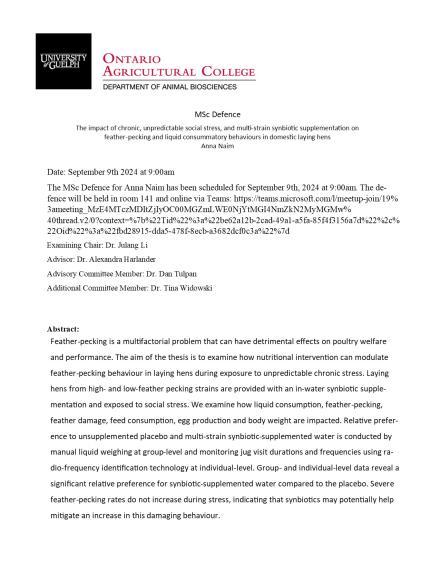Anna Naim's MSc Defence
Date and Time
Location
Room 141 and Teams: https://teams.microsoft.com/l/meetup-join/19%3ameeting_MzE4MTczMDItZjIyOC00MGZmLWE0NjYtMGI4NmZkN2MyMGMw%40thread.v2/0?context=%7b%22Tid%22%3a%22be62a12b-2cad-49a1-a5fa-85f4f3156a7d%22%2c%22Oid%22%3a%22fbd28915-dda5-478f-8ecb-a3682dcf0c3a%22%7d

Details
The impact of chronic, unpredictable social stress, and multi-strain synbiotic supplementation on feather-pecking and liquid consummatory behaviours in domestic laying hens
Feather-pecking is a multifactorial problem that can have detrimental effects on poultry welfare and performance. The aim of the thesis is to examine how nutritional intervention can modulate feather-pecking behaviour in laying hens during exposure to unpredictable chronic stress. Laying hens from high- and low-feather pecking strains are provided with an in-water synbiotic supplementation and exposed to social stress. We examine how liquid consumption, feather-pecking, feather damage, feed consumption, egg production and body weight are impacted. Relative preference to unsupplemented placebo and multi-strain synbiotic-supplemented water is conducted by manual liquid weighing at group-level and monitoring jug visit durations and frequencies using radio-frequency identification technology at individual-level. Group- and individual-level data reveal a significant relative preference for synbiotic-supplemented water compared to the placebo. Severe feather-pecking rates do not increase during stress, indicating that synbiotics may potentially help mitigate an increase in this damaging behaviour.